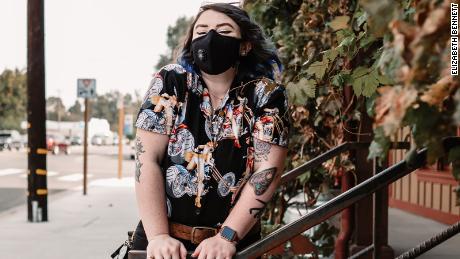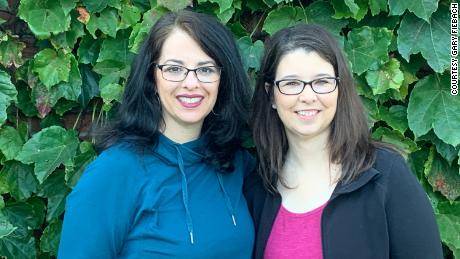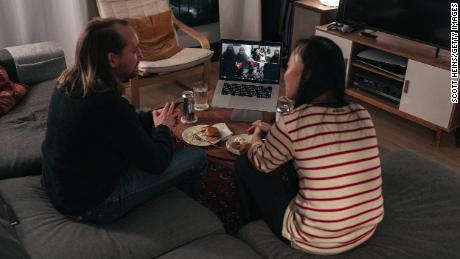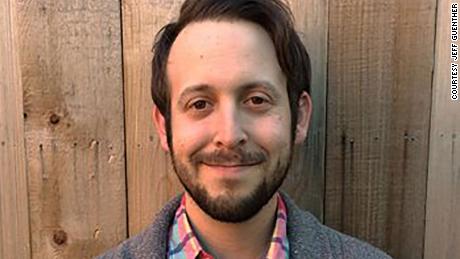Some say distance and differences in how their peers handle the pandemic have changed their relationships — and not for the better
“You do not get to like this post with (the) amount of restaurants you eat at. [expletive] I mean it,” she wrote.
But Instagram has also been a window into the day-to-day activities of people who have gone about their lives as if there were no pandemic: eating at restaurants mask-free; going on lavish vacations; hanging out at bars.
So when one of those friends hit “like” on one of her posts, she didn’t hold back.
“I have no patience for people who don’t think literal rules apply to them,” Mahler told CNN. “And for people who don’t have an understanding about the disconnect between their behavior and reality.”
Relationships, like the one between Mahler and her childhood friend, have been tested during the pandemic.
While the first few months led to Zoom hangouts and remote celebrations, deepening and visible divisions in how people are handling the ongoing pandemic have become the source of growing tension — and sometimes outright conflict.
But as 2020 comes to an end, others say distance, as well as differences in how their friends handle the pandemic, has changed their relationships — and not necessarily for the better.
They feel judged, she said — or they feel guilty, or they feel judgmental.
For some, their values no longer align
Like Mahler, 33-year-old Manisha Jogia found herself at odds with one of her friends during the pandemic.
“We were just talking about it and one thing led to another, and we both sort of started pointing fingers at each other,” she told CNN.
“Everyone’s just doing what they think is right during the pandemic. … Everyone’s flexible in their own ways. I was going to the protests, for example. And he was calling me out for that. He was like, ‘I feel like what you’re doing is worse.'”
After she cooled down, Jogia said she reached back out to him. But she didn’t hear back — until her friend sent her an email, ending their relationship for good.
“He essentially just said I’m not interested in continuing a friendship with someone who judges based on my actions or whatever,” Jogia said.
“For me, I was like, I’m going to cut my loss here. Because I feel like people are really revealing themselves right now. I feel like I’ve seen a lot of people who I loved and respected be really selfish … and I don’t have time to surround myself with people who are not going to care about other people.”
For others, it’s not differences — but distance
Even some people whose values still align with those of their friends have found their relationships suffering during the pandemic.
The reason for their drift is not rooted in ideological differences, but rather distance.
While video calls over Zoom or Facetime have helped, many have said that after spending most of the year staring at a screen, they’ve had enough.
Martin Odima Jr. sits through six to eight video calls a day using three different video conferencing platforms. He’s a special education teacher, coach and adjunct faculty member at a university in Minneapolis.
His 7-year-old daughter is among the many students nationwide who are doing virtual learning. So, he said, the two of them are glued to screens all day.
When his friends plan a Zoom meeting to play games and catch up, he finds it difficult to join in.
“It’s hard to ‘show up’ and actively pursue social activities with my friends online since I am doing it all day,” he told CNN. “I am definitely tired after doing virtual meetings and it takes a while to acclimate back to reality.”
Odima said he used to get headaches from so much screen time. Now, he forces himself to plan five to 10 minute breaks in between his daily work calls so he can take quick walk or exercise.
These relationships may have been forever altered
Jeff Guenther, a Portland, Oregon-based therapist, made the decision to stay home for Thanksgiving rather than travel to see his family in Los Angeles. He joined his family’s holiday gathering via Zoom.
“We felt this certain amount of pressure because we couldn’t get together at all this holiday season. So we might as well try to do it online — which only caused even more rupture and problems,” he told CNN.
“All of our family issues that are always kind of under the surface are even more apparent on Zoom — and during a pandemic on top of everything else.”
“I feel right and she feels right and it’s made us less close, in an already sort of, long distance relationship,” Guenther said. “This argument has caused the rest of my family to take sides.”
Still, Guenther, who has been a therapist for about 15 years, said there are some ways to repair relationships that end up tarnished as a result of conflicting views.
It’s important to identify whether each of you have the same goal, he said. For example, he and his sister know they want to keep their parents safe, and they don’t want to spread the coronavirus.
“If we can both find things that we agree on at the start, then we can both talk about it in these curious ways,” he said.
He also emphasized that people must acknowledge everyone has to come up with safety plans that make sense to them, even if it doesn’t make sense to you.
As for Zoom fatigue, Guenther suggests making the calls shorter, turning the video off or stepping outside while on the phone to get a break from the screen.
“My advice would be to really check in and see if you have the capacity to be on these Zoom calls,” he added. “If you don’t have enough capacity, you might need to cancel that meeting.”
Ultimately, relationships “may be affected forever” after the pandemic, he said.
“If that’s the case … that’s one of the many traumas to come out of 2020 that we don’t even fully know about yet.”
![]()










